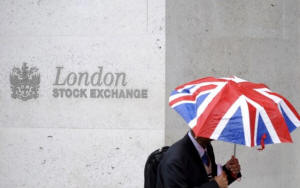|
World stocks rise off 2-1/2 month low,
China soothes currency markets
 Send a link to a friend
Send a link to a friend
 [July 03, 2018]
By Sujata Rao [July 03, 2018]
By Sujata Rao
LONDON (Reuters) - World stocks rose on
Tuesday, supported by gains in Europe and three straight days of
tech-driven rises in the United States, even though markets across Asia
and especially China remained in the grip of trade turbulence.
Wall Street was set for another firmer session as investors positioned
for strong Silicon Valley earnings before the reporting season starts
next week, while European shares also rose after a deal on settling a
migration policy row that had threatened Germany's coalition government.
But a July 6 deadline is looming for Washington to impose tariffs on $34
billion worth of Chinese goods that Beijing has vowed to match with
tariffs on U.S. products. President Donald Trump also threatened on
Monday to "do something" if the United States was not better treated by
the World Trade Organisation.
The prospects of a full-blown trade war and relentless yuan weakening --
it has fallen 5 percent in the past two weeks to 10-month lows --
reportedly forced China into intervention via state-run banks.. The
currency then reversed earlier losses to move back into positive
territory for the day against the dollar.

"It is by far the biggest (yuan loss) I can remember. Prudence suggests
it has to be matched across South East Asia because of the competitive
implications," Bank of New York Mellon strategist Neil Mellor said.
"So if you have all these currencies weakening and the dollar
strengthening against other emerging markets currencies as well, it
generates a degree of instability in the market simply by virtue of its
scale."
Other Asian currencies weakened, especially those such as the Indonesian
rupiah that are doubly exposed -- to trade and oil prices approaching
$80 a barrel.
On equity markets, Hong Kong dived as much as 3.3 percent at one point
to nine-month lows, hit also by a U.S. move to block China Mobile from
offering services to the U.S. market. Shanghai's bourse hit a 2-year
trough though both indexes inched higher toward the close as the yuan
recovered. Japan's Nikkei edged to a near three-month closing low.
The mood was more cheerful in Europe where a pan-European equity index
rose half a percent, the euro firmed marginally and bond yields rose
after German Chancellor Angela Merkel struck the deal with her Bavarian
conservative coalition partners.
"The agreement between Chancellor Merkel and German interior minister
Horst Seehofer should see German political risk fade into the background
as a downside risk for the euro in the near-term," MUFG analysts told
clients.
Equity futures for the U.S. S&P500 and Nasdaq indicated a firmer session
after Wall Street ended higher on Tuesday for the third day in a row.
Gains of around 1 percent in tech firms such as Microsoft and Apple
offset concerns about trade and its impact on growth.
[to top of second column]
|

A worker shelters from the rain as he passes the London Stock
Exchange in the City of London at lunchtime October 1, 2008.
REUTERS/Toby Melville/File Photo

Tech shares have been relatively resilient to trade fears - the New
York Stock Exchange's index of 10 tech giants including China's
Alibaba has gained over 30 percent this year. They are seen
delivering another set of robust quarterly earnings.
That helped MSCI's world index to rise 0.2 percent, inching further
off recent 2-1/2 month lows.
CENTRAL BANKS AND CURRENCIES
While U.S. growth and company earnings seem unassailable,
tit-for-tat tariffs from China and Europe may ultimately prove
detrimental for American businesses and jobs.
U.S. Treasury bond yields rose slightly amid the easier mood but
concern about the trade row has pushed the gap between two- and
10-year yields to the narrowest since 2007
"The recent intensification of global trade tensions imply the
probability of trade conflict has risen to levels that could result
in significant pain in financial markets and a sizable drop in
output and employment," Deutsche Bank wrote.
The dollar retreated 0.4 percent against a basket of currencies and
the easing tensions in Germany helped the euro to gain 0.2 percent
against the greenback.
But those most exposed to trade such as the Australian dollar and
emerging currencies remain under pressure -- the Aussie, considered
a liquid proxy for China-related risk, was close to 1-1/2-year lows
against the greenback
The Reserve Bank of Australia (RBA) kept rates at a record low 1.5
percent on Tuesday and showed no hint of raising them soon. Its
governor cited "the direction of international trade policy in the
United States" as an uncertainty.

The Turkish lira, seen as an emerging markets weak link, fell more
than 1 percent after data showed June inflation accelerating to
14-year highs, hit by oil prices and the pass-through from currency
weakness.
(Additional reporting by Tomo Uetake in Tokyo, Marc Jones and Tricia
Wright in London; editing by David Stamp)
[© 2018 Thomson Reuters. All rights
reserved.]
Copyright 2018 Reuters. All rights reserved. This material may not be published,
broadcast, rewritten or redistributed.
Thompson Reuters is solely responsible for this content. |